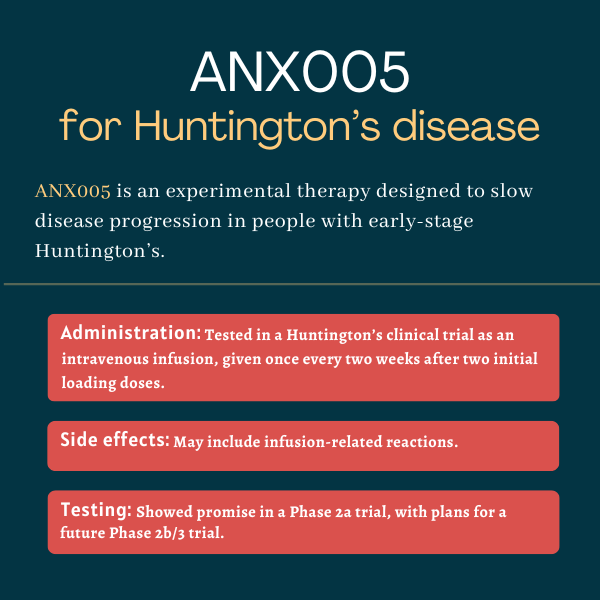 Discussion
Discussion
ANX005 for Huntington’s disease
Last updated Aug. 8, 2024, by Lindsey Shapiro, PhD

What is ANX005 for Huntington’s disease?
ANX005 is an investigational treatment being developed by Annexon Biosciences for people with early-stage Huntington’s disease.
Given via into-the-vein (intravenous) infusions, the experimental therapy is designed to slow Huntington’s progression by blocking an immune pathway that’s implicated in the neurodegenerative condition.
ANX005 received orphan drug designation in the U.S. for Huntington’s. The status provides financial incentives and regulatory support to speed its clinical development.
It is also being developed for amyotrophic lateral sclerosis, another neurodegenerative disease, and Guillain-Barré syndrome, a rare autoimmune condition affecting the nervous system.
Therapy snapshot
| Treatment name: | ANX005 |
| Administration: | Being tested in Huntington’s as an intravenous infusion |
| Clinical testing: | Completed a Phase 2a clinical trial; poised for a Phase 2b/3 study |
How does ANX005 work in Huntington’s disease?
Huntington’s is caused by mutations in the HTT gene that result in progressive neurodegeneration in certain brain regions. Synapses, the junctions through which nerve cells communicate to coordinate the brain’s activity, are progressively lost. This leads to a range of motor, cognitive, and behavioral symptoms.
The immune system’s classical complement pathway, particularly its initiator, C1q, has been implicated in synaptic loss. During complement activation, C1q accumulates at a target site, recruiting other components of the complement cascade that eventually signal for immune cells to come and remove a threat.
During normal brain development, C1q is involved in helping tag unneeded synapses for elimination by the immune system to fine-tune brain function, a process called synaptic pruning.
In Huntington’s, it is believed that C1q abnormally accumulates at synapses, driving overactivation of the complement cascade, and subsequently causing neuroinflammation and the loss of necessary synapses. This process may begin early on, before symptoms are evident.
ANX005 is an antibody that selectively suppresses C1q, thereby preventing classical complement activation. In doing so, it is thought to protect against synaptic loss and slow neurodegeneration in Huntington’s and other neurodegenerative conditions.
How will ANX005 be administered in Huntington’s disease?
In the single trial to date testing ANX005 in Huntington’s patients, the therapy was administered through intravenous infusions. Treatment involved an initial 21-hour loading dose, and a second five-hour loading dose five days later. Thereafter, ANX005 was given as a maintenance dose once every two weeks, with each infusion lasting four to five hours.
ANX005 in Huntington’s disease clinical trials
ANX005’s safety, tolerability, pharmacological properties, and preliminary efficacy were evaluated in 25 adults with early-stage Huntington’s and three adults at risk of the disease in a U.S.-based Phase 2a trial, called ANX005-HD-01 (NCT04514367).
Those considered to be at risk of Huntington’s carried a disease-causing mutation but were not yet showing symptoms.
With dosing starting in 2020, all participants were given two loading doses of AN005, separated by five days, followed by maintenance doses, once every two weeks for up to 22 weeks (about five months). After that, they were followed for about three months without any treatment.
Final results showed C1q levels were completely depleted in the blood and the fluid surrounding the brain and spinal cord after the initial loading dose and throughout the treatment period. During the subsequent three-month off-treatment period, C1q levels showed a gradual increase.
ANX005 treatment also led to reductions in other markers of complement activation, as well as markers of neuroinflammation.
For exploratory efficacy outcomes, the researchers assessed changes in the composite Unified Huntington’s Disease Rating Scale (cUHDRS) and total functional capacity (TFC), two measures of patients’ overall functional skills. In both measures, higher scores reflect better function.
Consistent with interim findings, final efficacy data showed scores on both measures remained generally stable over the entire study, even after treatment was stopped. This is in strong contrast to the expected decline in these measures over time based on the natural disease course of Huntington’s.
A greater proportion of participants with high complement activity at the start of the study, as reflected by a complement C4a/C4 ratio above the median, experienced functional improvements relative to those with lower complement activity (75% vs. 36%).
The subgroup of participants with high complement activity experienced increases in cUHDRS scores at all time points during treatment, while those in the low activity subgroup showed score declines relative to the study’s start. At the end of treatment, these score differences were statistically significant.
Similar trends were observed for TFC scores, although score differences between the two subgroups did not reach statistical significance.
Annexon has reported that ANX005 is now poised for Phase 2b/3 clinical testing.

Common side effects of ANX005
In the single trial to date, the most common side effects of ANX005 in people with early-stage Huntington’s or at risk of the disease were infusion-related reactions, most often a rash, with the first infusion.
The therapy was reported to be otherwise well tolerated, although a few treated patients developed autoimmune-like adverse events that could possibly be related to ANX005.
Still, this was a small and short-term study, so more trials are needed to offer a better picture of ANX005’s side effect profile in this patient population.
Huntington’s Disease News is strictly a news and information website about the disease. It does not provide medical advice, diagnosis, or treatment. This content is not intended to be a substitute for professional medical advice, diagnosis, or treatment. Always seek the advice of your physician or other qualified health provider with any questions you may have regarding a medical condition. Never disregard professional medical advice or delay in seeking it because of something you have read on this website.
Recent Posts
- Tiny systems that keep my life moving with Huntington’s disease
- UK company selects HRN001 as its lead Huntington’s therapy candidate
- Giving thanks for the brave volunteers who participate in HD clinical trials
- The challenges of navigating dating while living with Huntington’s disease
- Guest Voice: I hate Huntington’s disease, but I love my husband
Related articles
-
 Discussion
Discussion
-
-



